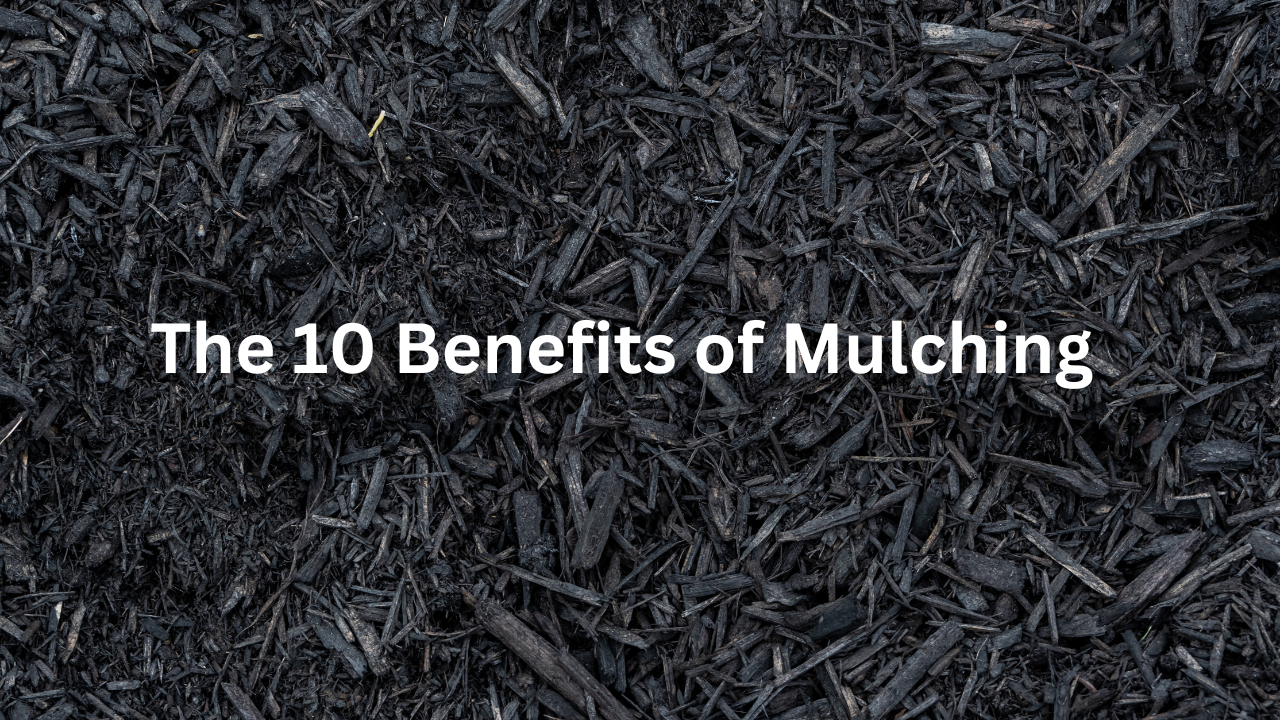The 10 Major Benefits of Mulching Your Landscape

Applying mulch to your landscaping is one of the best things you can do for your landscape beds. Here are the 10 major benefits of mulching your landscape beds in New Jersey:
Weed Suppression: Mulch acts as a barrier, preventing sunlight from reaching weed seeds and inhibiting their growth. This reduces the need for manual weeding and the use of herbicides. Mulching is one of the best things you can do for your landscaping beds to deter weed growth.
Moisture Retention: Mulch helps retain soil moisture by reducing evaporation, which is especially beneficial during New Jersey's hot summer months. This can help save on water usage and keep your plants hydrated.
Temperature Regulation: Mulch acts as an insulator, helping to maintain more consistent soil temperatures. In New Jersey, this can be particularly useful to protect plants during harsh winters and hot summers.
Erosion Control: Mulch helps to prevent soil erosion by reducing the impact of heavy rainfall. This is important in regions like New Jersey that can experience heavy storms during the spring, summer and fall. Mulching will also help with soil erosion prevention- in regions with sloped landscapes, such as parts of New Jersey, mulch can help prevent soil erosion by reducing the impact of rainfall and runoff.
Soil Enrichment: Organic mulches, like wood chips or shredded leaves, break down over time and add nutrients to the soil, improving its fertility. This can benefit plant growth in the long term.
Enhanced Curb Appeal: Mulched landscape beds look neat and well-maintained, enhancing the overall appearance of your property. Different mulch colors and types can be used to create visually appealing designs.
Disease Prevention: Mulch can act as a barrier between the soil and plant foliage, reducing the likelihood of soil-borne diseases splashing onto the leaves. Mulch is a great way to protect the roots of your plants!
Reduced Soil Compaction: By providing a protective layer, mulch can prevent heavy rain or foot traffic from compacting the soil, ensuring that it remains loose and conducive to root growth.
Easy Maintenance & Aesthetic Benefits: Landscape beds with mulch generally require less maintenance than bare soil, as they are less prone to weed growth and can stay tidier for longer periods. Mulch can enhance the visual appeal of your landscape by providing a neat, uniform appearance. You can choose from various mulch types to complement your garden's style and colors.
When mulching your landscape beds in New Jersey, consider factors like the type of mulch (organic or inorganic), the depth of the mulch layer, and the specific needs of your plants. By doing so, you can take advantage of these benefits and create a healthier and more attractive outdoor space.
When Should You Mulch Your Landscaping?
The best time to apply mulch to your landscape is in the spring and fall. The ideal time to mulch your landscape beds in New Jersey does depend on the specific needs of your garden and the weather conditions in your area. Here are some general guidelines to help you determine when to mulch:
Spring: Late spring, typically around May or early June, is a common time to apply mulch in New Jersey. By this time, the soil has warmed up, and the threat of frost has passed. This is a good time to mulch to help retain moisture, control weeds, and prepare for the growing season.
Fall: Many gardeners in New Jersey also choose to mulch in the fall, usually in late October or early November. Fall mulching helps protect plants from winter cold, reduces temperature fluctuations, and prepares your landscape for the following growing season. Make sure to mulch after the soil has cooled but before the ground freezes.
After Planting: If you're adding new plants to your landscape beds, it's a good practice to mulch immediately after planting. This helps with moisture retention, weed control, and temperature regulation for the newly established plants.
Mulch Refresh: If you've mulched in the spring or fall, you may want to do a light mulch refresh in mid-summer. This can help maintain moisture levels during the hottest months and provide an additional layer of weed suppression.
Keep in mind that the depth of mulch is crucial. Apply 2-4 inches of mulch, but avoid piling it too close to the base of trees or plants, as this can cause moisture and pest problems. Leave a small gap around the base of plants to allow for airflow. It's a good idea to monitor your landscape beds throughout the year and adjust your mulching schedule based on your garden's specific needs and the local weather conditions here in New Jersey.
We offer residential and commercial mulching services. We provide mulching services to Old Bridge, East Brunswick, Sayreville, South River, Monroe, South Amboy, Marlboro, Milltown, Spotswood, and all surrounding towns. If you need mulch- give us a call today!
How Often Should You Mulch Your Landscape?
The frequency of mulching your landscaping in New Jersey can vary depending on several factors, including the type of mulch you use, your garden's specific needs. Here are some general guidelines to help you determine how often to mulch your landscaping:
Spring Mulching: Many gardeners in New Jersey choose to mulch in the spring, typically around May or early June. Spring mulching helps prepare the garden for the growing season, retain moisture, and control weeds. Once a year in the spring is usually sufficient for most gardens.
Fall Mulching: Some gardeners opt for a second mulching in the fall, usually in late October or early November. Fall mulching helps protect plants from winter cold, maintain soil temperatures, and prepare for the following growing season. Not all gardens require fall mulching, but it can be beneficial, especially in regions with harsh winters.
Mulch Refresh: In addition to the primary spring and optional fall mulching, you might consider doing a light mulch refresh in mid-summer. This doesn't necessarily involve adding a full layer of mulch but can be used to replenish areas that have experienced mulch decomposition or been disturbed by weather or other factors.
It's important to assess your landscaping and garden bed condition regularly to determine when mulching is necessary. Check for signs such as thinning mulch, increased weed growth, soil erosion, and soil temperature fluctuations. Adjust your mulching schedule accordingly to meet your garden's specific requirements.
Ultimately, the number of times you should mulch your landscaping and/or garden in a year in New Jersey depends on factors such as the type of mulch, weather conditions, and the state of your garden, so there isn't a one-size-fits-all answer. If you have any questions or you are interested in mulching services contact us today!



